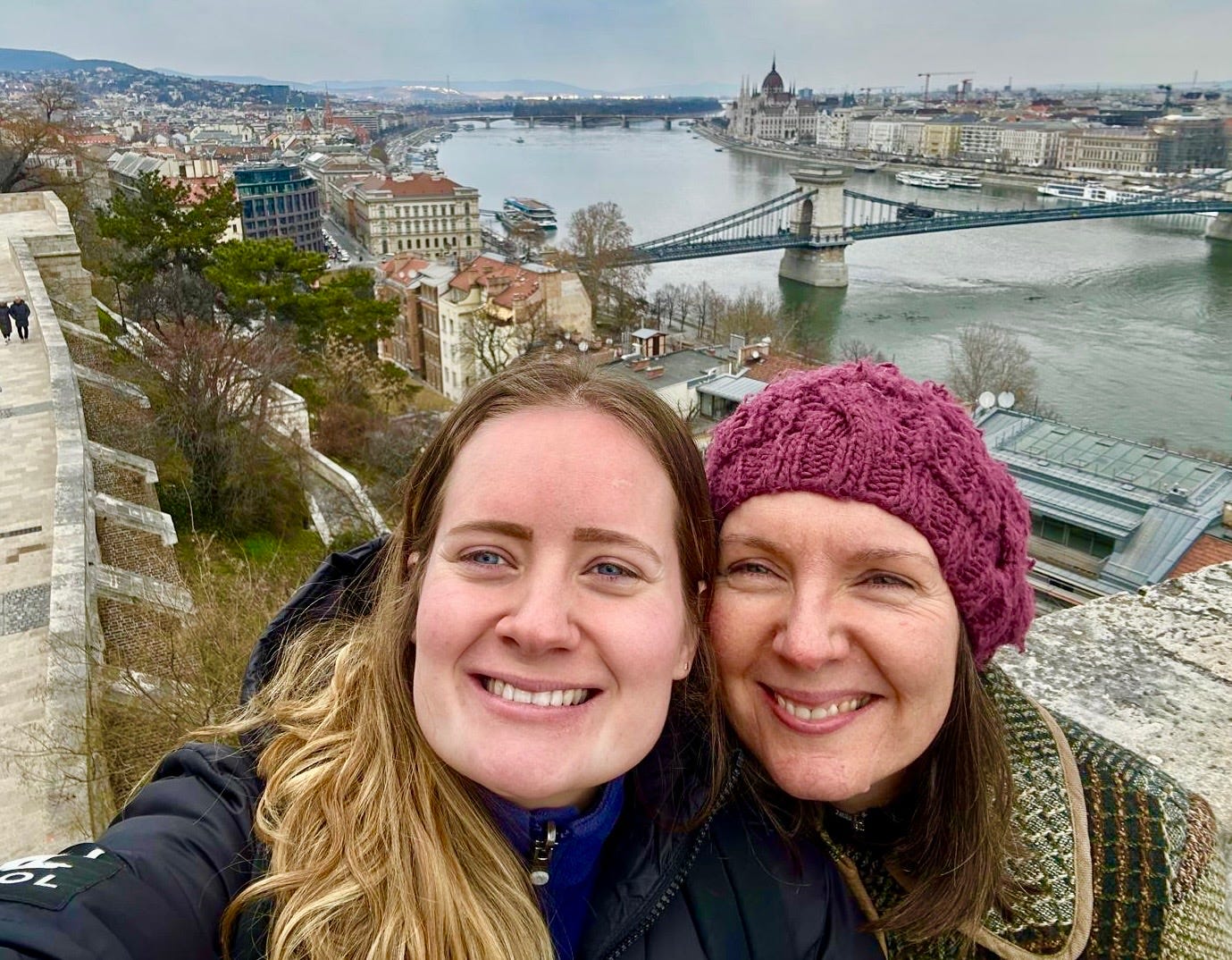004: The myth of ‘never enough time’
What's really in the way of you creating your best work?
When you want to create, what gets in the way?
The number one response I often hear is: lack of time.
I believed this too, when I juggled writing a novel with a full-time academic job, running a home and raising a daughter. I invested so many resources (time, energy, money) trying to fix what I assumed was the problem.
I devised elaborate time management systems in different journals (Moleskine; Leuchtturm dot grid for elaborate bullet journalling). I tried the Pomodoro method, combined with time blocking. These methods can be brilliantly effective—and they have been for me in my academic life—but they didn’t work for writing my novel. In two months, I produced only 2,000 words. And all that rigid planning sucked the joy out of my creativity.
I hired a writing coach, who suggested I schedule ‘golden hours’ during my peak energy times—time I was to protect fiercely. I loved this idea. ‘Golden’ suggested a shiny new relationship with my creative self. It spoke of ease, joy and pleasure. But it didn’t work.
It took a huge amount of reflection, honest self-appraisal and working with the right guide for me to see what was really going on: I’d been looking only to structures and systems to move my writing forward.
This made sense. As a professor and researcher—producing academic books and articles, and writing lectures—I’d systematised my writing for years. I’d been successful in my professional life and I expected the same for my creativity.
What was happening was a war between my ‘professional self’ and my ‘writer self.’
No wonder I felt scattered and exhausted.
Everything changed when I started to explore how I could integrate these parts of myself; when I took a deeper look at who I am and viewed things from a bigger perspective: inquiring into why I wanted to write, the impact it could make, the soul print it might leave on the world.
Looking back, I realise I tried to control my creativity as though breaking in an unruly horse, forcing it into the bridle of those time-blocked hours.
What I struggled with wasn’t ‘time.’
I’d lost sight of my creative power: the essence of who I am rather than the identities I was clinging to.
When I started making work that integrated this perspective, it changed everything. It released the friction I felt about writing. I no longer had to grapple with the myth of ‘not enough time.’ Expression came so much more easily. I finally finished my novel and had it accepted for publication. I went on to write a radio drama that was commissioned by the BBC.
There are still days when putting words on the page feels like wading through treacle. That's normal. But transformation happened when I moved from ‘doing’ mode—in which I tried to squeeze my creativity into the ‘right’ systems—and started to pay attention to ‘being.’ It involved an exploration of who I am beyond the fear holding me back, beyond the survival mechanisms (including the rigid planning) that I adopt to keep me safe.
This integration isn't just about finding balance—it's a new way of navigating the world. It requires working at multiple levels: embodying your creative identity, rather than thinking about it, and building consistent practices that emerge from essence rather than chasing ‘good ideas’ or creating from external ‘shoulds.’
I see this pattern repeatedly in the professionals I work with: brilliant people who've mastered their fields but find that their creativity is hemmed in behind invisible barriers. They've tried every productivity system and app; they’ve tried accountability groups and workshops; they’ve read countless books on creative practice. Yet their creative work stays hidden from the world.
The shift happens when they stop trying to ‘hack’ their creativity and learn instead to trust their natural rhythms, release the need to perfect everything before sharing it and create from a place of aligned purpose rather than obligation.
This is possible when you work with the whole of who you are—your professional excellence, your creative spirit, and everything in between. It's about uncovering your unique creative essence and diving deep into what dims that essence. It’s about letting your essence inform how you work, rather than fitting yourself into someone else's formula for success.
What if, instead of another system to follow, you could develop a relationship with creativity that feels as natural as breathing?
Wishing you ease in your creativity today.
Love, Rachel
Community inspiration
If you want to dive further into the relationship between time and creativity, you might like this article I wrote previously, which touches on the different types of time (chronos and kairos).
I loved this piece by
in ’s newsletter, ‘The Pulse’. It’s right on the money about working with who you are (in your being) in and with your creativity, rather than what you do.This week, I took a trip to Budapest with my daughter to rest, recharge, discover and adventure! We both agreed it’s always good to fill your eyes with new sights—and return with fresh perspectives. Here we are in exploring mode, on the bridge on the Buda (medieval) side of the city with the River Danube behind.
Creative inspiration
Attending to who we are in our creativity is important. But we need to manage (and have a positive relationship with) the time we have available for it.
Here are some books on time, productivity and creativity that I’ve found useful:
Books on the topic
Four Thousand Weeks by Oliver Burkeman. Burkeman’s core message is invaluable for those of us who tend to overcomplicate the creative process and procrastinate over doing and sharing our work. His premise is that the average human lifespan is only about four thousand weeks—and that accepting this fact inite nature of time is paradoxically liberating rather than anxiety-inducing. This book has been radical in helping me embrace constraints (including time) rather than hoping they will just disappear.
Saving Time: Discovering a Life Beyond the Clock by Jenny Odell. Creative blocks often stem from misconceptions about time and productivity rather than lack of skill or discipline: this is the main message of Odell’s book. She challenges the industrial notion of time as something to be maximised and argues that modern time management often fragments our attention. Odell lays out the case for a more holistic approach to time that allows for deep focus and genuine creative engagement.
You might also like this blog post, which celebrates the joys of exploration rather than focusing solely on the ‘execution’ part of the work.
Memorable quote of the week
The most regretful people on earth are those who felt the call to creative work, who felt their own creative power restive and uprising, and gave to it neither power nor time.
—Mary Oliver, ‘Of Power and Time’ in Upstream: Selected Essays
What’s next?
If there’s something you’re longing to create (a writing project, an artistic creation or new venture) but need more courage and guidance, I’m here to support you expand the power of your self-expression.
Here’s how I can help:
Make an appointment for a virtual coffee (free). I hold 3-4 slots every month so we can get to know each other. Perfect if you’re curious about meeting new people and making connections.
Book a 30-minute connection call (free). This is for anyone—whether you have an idea you want to brainstorm, an issue that’s holding you back, or you just want to know more about my work. Think of it as a microdose of powerful coaching that can help point you in the right direction!
Read my manifesto for creative courage (free). Learn about the core principles I work with in my own creativity and business and follow in serial form the journey of how I came to found Wordplay Coaching.
Inquiry of Writing, an intimate group coaching experience. We meet twice a month—in which we use writing as a tool for curiosity, exploration and transformation. Respond to powerful questions, in discussion and in writing; share your experience; get feedback on what you’ve written. Get the support and connection you need to gain clarity about your life and creativity, and develop your confidence. This is currently full but talk to me about joining the waiting list.
Creative Essence 1:1 coaching. Personal guidance to work with you on recognising your survival mechanisms and the fears that hold you back from expressing yourself fully. Twice-monthly deep dives on Zoom plus individualised support between sessions. This is ideal for you if you’re looking for deep transformation and powerful support to make changes in your life or with a creative project.





Great piece! So often we put emphasis on the output (doing) forgetting that we are human beings - emphasis on being. Before diving into the never ending to-do list what if we took a moment, even if just a small portion of our day to allow ourselves something fun, something that brings us joy, or something that simply allows us to breathe. For me that is time spent with thoughtful content like this.
So cool to read this …because l literally wrote a piece for next week this morning on a very similar topic….how lack of discipline and consistency often stems from then disconnect from who you are becoming / your evolution - and staying stuck in old patterns. So, I loved reading this. Totally resonate, thanks Rachel!